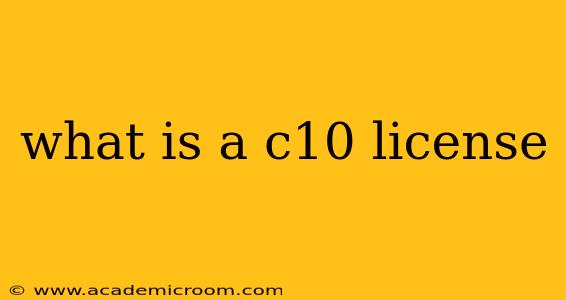The term "C10 license" refers to a specific contractor's license classification issued by the California Contractors State License Board (CSLB). It's crucial to understand that this isn't a standalone license but rather a classification within a broader contractor's license. This means a contractor with a C10 classification can perform specific types of work, but it's only one part of their overall licensing.
Let's break down what a C10 license classification entails and address some common questions.
What Type of Work Does a C10 License Cover?
A C10 license classification allows a contractor to perform Residential Alterations, Additions, and Repairs. This encompasses a wide range of work on single-family homes and other residential structures, but with specific limitations. The key here is that it generally focuses on repairs and modifications to existing structures rather than new construction.
This includes tasks like:
- Remodeling bathrooms and kitchens: Replacing cabinets, countertops, fixtures, and tiling.
- Adding rooms or expanding existing spaces: Subject to size and complexity limitations.
- Repairing damaged structures: Fixing roofs, foundations, drywall, and other structural components.
- Installing flooring and other interior finishes: Painting, carpeting, and similar work.
What Doesn't a C10 License Cover?
It's equally important to understand the limitations of a C10 license. Contractors with this classification cannot perform the following:
- New construction of residential buildings: This typically requires a different, more extensive license classification.
- Work on commercial or industrial properties: These projects require separate licenses tailored to those building types.
- Specific types of specialized work: Electrical, plumbing, and HVAC work often require additional sub-licenses or specialized contractors.
What are the Requirements for Obtaining a C10 License?
Obtaining a C10 license, as part of a larger contractor's license, requires meeting several requirements set by the CSLB, including:
- Passing a contractor's exam: The exam covers business and law aspects of contracting as well as technical knowledge relevant to the specific classification.
- Providing proof of experience: Demonstrating a certain number of hours of relevant experience in the field is essential.
- Passing a background check: The CSLB conducts background checks to ensure contractors meet ethical and legal standards.
- Maintaining a valid business license: Having the correct business registration with the state.
- Meeting financial responsibility requirements: This might include bonding, insurance, or other forms of financial security.
How Can I Find a Licensed C10 Contractor?
It's critical to verify that any contractor you hire is properly licensed and insured. The CSLB website provides a searchable database where you can look up a contractor's license status and classification. Always check this database before hiring anyone to work on your home.
What is the Difference Between a C10 and Other Contractor Licenses?
California offers numerous contractor license classifications, each with different scopes of work. A C10 license focuses on residential alterations and repairs, while others encompass new construction, specialized trades, or commercial projects. Choosing the right contractor with the correct license is vital for legal compliance and project success.
Is a C10 License the Right Choice for My Project?
The suitability of a C10 contractor depends entirely on the nature of your project. If you're planning extensive renovations or additions to your home, you might need a contractor with a broader license classification. For smaller repairs or modifications, a C10-licensed contractor may be sufficient. Always consult with multiple contractors and carefully review their license classifications before making a hiring decision. Misunderstanding license classifications can lead to legal and financial issues. It's always recommended to seek clarification from the CSLB if you're unsure.
